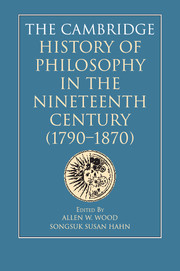Book contents
- Frontmatter
- Contents
- Contributors
- Preface
- Abbreviations
- Introduction
- I Philosophy in the Nineteenth Century
- II Logic and Mathematics
- 4 Attempts to Rethink Logic
- 5 Some developments in the philosophy of mathematics, 1790–1870
- III Nature
- IV Mind, Language, and Culture
- V Ethics
- VI Religion
- VII Society
- VIII History
- References
- Index
- References
4 - Attempts to Rethink Logic
from II - Logic and Mathematics
Published online by Cambridge University Press: 05 December 2012
- Frontmatter
- Contents
- Contributors
- Preface
- Abbreviations
- Introduction
- I Philosophy in the Nineteenth Century
- II Logic and Mathematics
- 4 Attempts to Rethink Logic
- 5 Some developments in the philosophy of mathematics, 1790–1870
- III Nature
- IV Mind, Language, and Culture
- V Ethics
- VI Religion
- VII Society
- VIII History
- References
- Index
- References
Summary
The period between Kant and Frege is widely held to be an inactive time in the history of logic, especially when compared to the periods that preceded and succeeded it. By the late eighteenth century, the rich and suggestive exploratory work of Leibniz had led to writings in symbolic logic by Lambert and Ploucquet. But after Lambert this tradition effectively ended, and some of its innovations had to be rediscovered independently later in the century. Venn characterized the period between Lambert and Boole as “almost a blank in the history of the subject” and confessed an “uneasy suspicion” that a chief cause was the “disastrous effect on logical method” wrought by Kant’s philosophy. De Morgan began his work in symbolic logic “facing Kant’s assertion that logic neither has improved since the time of Aristotle, nor of its own nature can improve.”
De Morgan soon discovered, however, that the leading logician in Britain at the time, William Hamilton, had himself been teaching that the traditional logic was “perverted and erroneous in form.” In Germany, Maimon argued that Kant treated logic as complete only because he omitted the most important part of critique – a critique of logic itself. Hegel, less interested in formal logic than Maimon, concurs that “if logic has not undergone any change since Aristotle, … then surely the conclusion which should be drawn is that it is all the more in need of a total reconstruction.” On Hegel’s reconstruction, logic “coincides with metaphysics.” Fries argued that Kant thought logic complete only because he neglected “anthropological logic,” a branch of empirical psychology that provides a theory of the capacities humans employ in thinking and a basis for the meager formal content given in “demonstrative” logic. Trendelenburg later argued that the logic contained in Kant’s Logic is not Aristotle’s logic at all, but a corruption of it, since Aristotelian logic has metaphysical implications that Kant rejects.
- Type
- Chapter
- Information
- Publisher: Cambridge University PressPrint publication year: 2012
References
- 8
- Cited by

